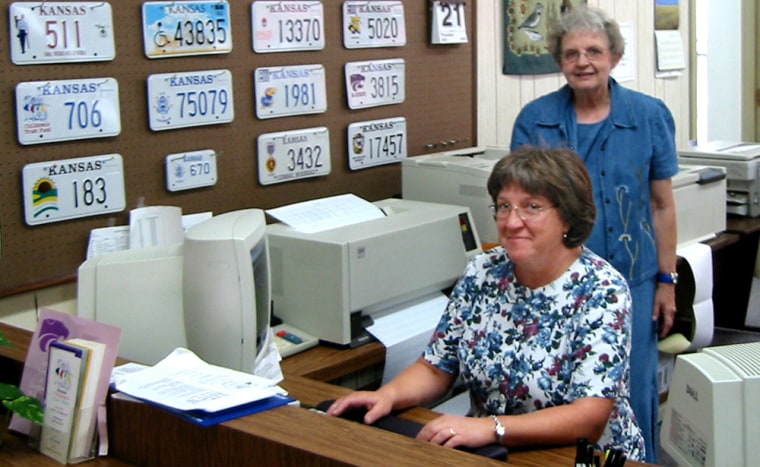Federal law will make county treasurer Paula Schneider do something that would be plain rude on the streets of this little town: treat friends as strangers.
Never mind that she knows practically everyone who walks into her office and wants a driver’s license. Under the REAL ID Act meant to deter terrorists, Schneider will have to make neighbors prove who they are.
Homeland security is taking a toll on the homespun way of doing things at government offices like hers.
The law will require people to come up with more papers attesting to their identity and citizenship status before they get a driver’s license. States say this will drive up costs and lengthen lines at motor vehicle offices.
Schneider anticipates headaches and hard feelings. “We’ll have unhappy people,” she said. “They’ll say, 'You know me.”’
People in bigger places are accustomed to impersonal take-a-number processing and Soviet bread-line waits at their driver’s license office. Not so in Ellsworth, a central Kansas town of 2,100 residents and some 800 inmates at the big state prison on the outskirts.
Government business is done with a breezy informality.
Informal way of doing business
“Right now if somebody comes in who lost their license, we’ll write down their name and their birthday and go back there and see what we can find on the computer,” said Schneider, gesturing behind the counter of her office in the old stone courthouse.
A high-school yearbook may suffice to establish someone’s identity. But because neighbors are serving neighbors, even that much is usually unnecessary now.
Under the changes, though, people will have to prove themselves several times over.
Asked how many of the people who come in the door she already knows, Schneider said, “Most of them.” She paused and corrected herself. “All of them.”
In Ellsworth, people have little reason to carry around identifying documents.
“A lot of people don’t know where their birth certificates are,” said clerk Geneva Spoon, who also deals with licenses.
Even so, local officials are more on their toes now because of the attacks of Sept. 11, 2001.
Spoon attended a seminar that taught her more about how to spot false identification. She pulls out a magnifying glass and shows how the signature line on a Social Security card is not the solid ink that it appears to be, but rather spells Social Security Administration repeatedly in letters too small for the naked eye.
That is just one of the devices meant to foil everyday forgers. Local officials are not confident they can catch the most sophisticated fakes.
‘We're not on the front lines’
“In a big city, I’d be very particular,” Spoon said. Plus, “They’re better trained to know what’s false. We’re not on the front lines.”
The homeland security ethic, however, holds that terrorists can strike or infiltrate anywhere.
The REAL ID Act addresses this in part by establishing national standards, starting in 2008, for verifying that license applicants are U.S. citizens or legal residents.
Driver’s licenses are the principal photo IDs that allow people to board planes and get into federal buildings.
Governors from both parties complained at their recent national meeting that state and local motor vehicle authorities are ill-equipped to serve, in essence, as immigration or law-enforcement officials. The states and the District of Columbia issue some 220 million driver’s licenses.
Privacy advocates say that regardless of how technologically advanced IDs become, they can be lost, stolen or altered.
A few years ago, Schneider said, illegal migrant workers from outside her area came in to get driver’s licenses, using false documents. She said they were going town to town trying to take advantage of lax procedures. “We finally put a stop to that.”
These days, someone who comes in for a license may be approved for one but does not get it on the spot. The card is mailed from Topeka, the capital, under a system designed to deny licenses to people without a legitimate address.
At the seminar, Spoon heard from an official who preached the bureaucratic way of treating everyone alike. The official told about how she made a young man prove who he was even though she was so close to the family that she had attended his birth.
